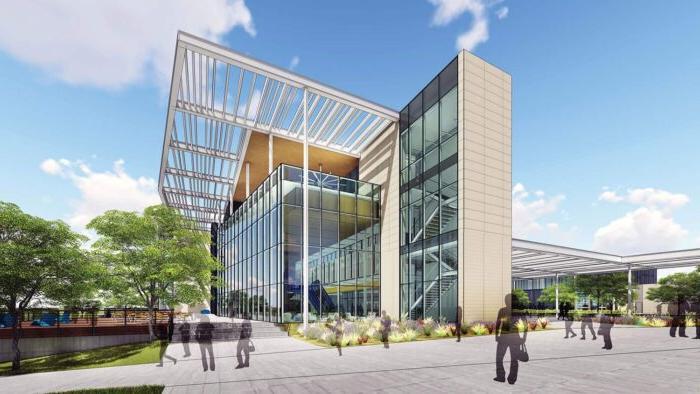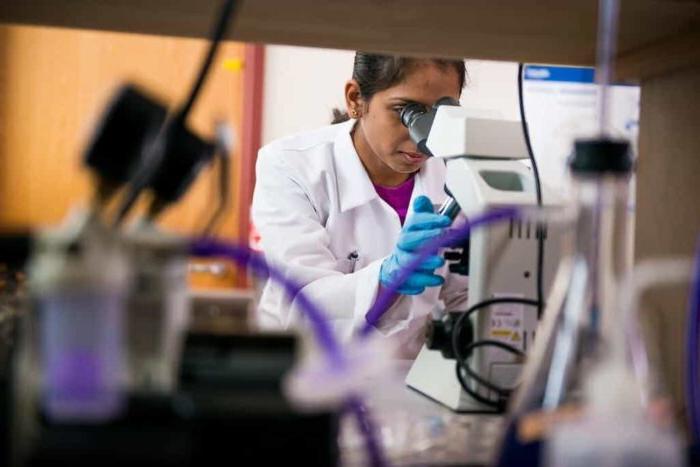
- On this page:
-
 Programs
Programs
-
 Research
Research
-
 Contact Us
Contact Us
Department of Biological and Environmental Science
From Lab to Life
Explore your passion for biology and the environment at East Texas A&M. Our Department of Biological and Environmental Science offers undergraduate and graduate programs in biology, environmental science, wildlife conservation science and teacher certification. We also offer a fully online Master of Science degree in biological sciences.

Welcome from the Department Head
Welcome to the Department of Biological and Environmental Sciences at East Texas A&M University. The department offers a dynamic learning environment, exciting cutting-edge research opportunities and strong mentorship by world-class scientists. Our undergraduate and graduate programs in cell and molecular biology, conservation biology, ecology, environmental science and biology education are all designed to train and educate students to meet the challenges of modern sciences. We invite you to explore our exceptional education and research opportunities.
Explore Our Programs
Biological Sciences (BA/BS)
The BS or BA program at East Texas A&M University equips students with the skills needed for careers in research, sciences, or health/medicine. The program will provide students with a comprehensive overview of biological sciences. Emphasizing different levels of biology; e.g., the molecular and cellular composition of living organisms up to learning how organisms interact with the world around us.
Emphasis Areas:
- Pre-Medicine
- Pre-Physician Assistant
- Pre-Dental
- Pre-Pharmacy
- Pre-Physical Therapy
- Pre-Optometry
- Cell & Molecular Biology
- Wildlife Ecology
Biological Sciences (BS to MS) Accelerated
Streamline your path to achieving both your Bachelor’s and Master’s degrees in less time than pursuing them separately.
Biological Sciences (BS) Teaching Emphasis
This program supplies students with the skills needed for a career as a life science teacher for grades 7-12. The program will provide students with a comprehensive overview of biological sciences while teaching students how to channel their knowledge directly into a classroom environment. This program allows students to combine an interest in biology with the passion of influencing and shaping the lives of the next generation.
Biological Sciences (MS)
The MS program at East Texas A&M University equips students with the skills to further their professional goals or prepare for entry into a doctoral program. This program enables students to further their education while closely working with faculty members with similar interests. Faculty research interests within the department include behavioral ecology, environmental science, microbiology, neuroscience, molecular, cellular and developmental biology, as well as wildlife ecology and conservation.
Biological Sciences (MS) Non-Thesis
The MS Non-Thesis program at East Texas A&M University allows for remote learning to further educational opportunities. This program allows students to choose from a large range of electives that interest them. This track is designed for teachers as it allows them to teach dual-credit and undergraduate courses at the college level.
Environmental Science (BS)
The BS program at East Texas A&M University equips students with the skills needed for careers in pollution remediation, environmental impact assessment, regulation enforcement, research, and much more! This degree program provides students with a comprehensive overview of environmental and earth sciences using coursework, collaborative research, and firsthand field experience. This program equips students with the ability to work for private corporations or state, federal and local environmental regulatory agencies.
Wildlife and Conservation Science (BS) Biology Track
The BS program at East Texas A&M University equips students with the skills needed for careers as wildlife ecologists, game managers, state and federal wildlife biologists, botanists, nature preserve specialists, and much more! This program strives to provide top education through hands-on research at our university wetland, practical exercises, field trips, internships, and personal instruction in the classroom. Students learn how to deal with wildlife challenges; e.g., maintain an abundant and healthy wildlife populations and habitats with the increasing numbers of demands on natural resources. This program is offered as a collaboration between the Department of Biological and Environmental Science and the College of Agricultural Sciences and Natural Resources.
Student Support
BioPride
BioPride is a one-week program that introduces biology coursework to freshman students before the first week of classes. This program helps you transition from the high school classroom to the university setting. You’ll gain insight into the discipline by attending lectures and learning laboratory techniques.
JAMP
Joint Admission Medical Program (JAMP) is a special program created by the Texas Legislature to support and encourage highly qualified, economically disadvantaged Texas resident students pursuing a medical education. It is funded through the Texas Higher Education Coordinating Board.
SCHOLARSHIPS
As a biological and environmental studies student, you have access to a wide range of scholarships specific to your degree.
Our Research
Our biological and environmental science faculty are excited to develop your knowledge and skills through research. Opportunities are available for both undergraduate and graduate students. We encourage you to discuss any research interests with your professors.
Super Quail Project
The Super Quail Project works to produce an affordable gamebird with wild-type survivability and a more stringent thermal tolerance so that they are prolific in challenging environments. We've made great progress in this arena and are building a Super Quail Production facility that will begin construction in 2024.
Human Dimensions Of Quail Sustainability
With declining populations of quail where there once was a thriving population, it is important to step back and consider how humans contribute to this change.
Quail Chick Development
Since 50-80% of quail adults die each year, and a quail’s lifespan is ~6 months, quail populations hinge on sustained quail chick production. Yet, that is the main cause of quail population decline in drought years. Accordingly, The Quail Research Laboratory is able to recreate field conditions in the lab to develop solutions for chick production in adverse conditions. We also develop the normal stages of development for various quail species and look at environmental pollutants and medicated feed on quail chick production and development. Learn More
Quail Research Station Program
Gamebird and quail populations are declining across the globe. Developing solutions for population sustainability is key to reversing these trends. The Quail Research Laboratory is unique in that our smallest research stations spans more than 500,000 acres. We image large-scale populations through innovative monitoring and provide results that explain observed mysteries of “where did all the quail go?” We have research stations in Montana, Kansas, California and Texas with comprehensive research into the impacts of climate, weather, management and other factors on a suite of upland gamebirds and waterfowl. Learn More
Unmanned Air Systems – Assisted Wildfire Fighting in Wildland Urban Interface Zones
A collaborative research effort between multiple universities is ongoing with a goal to improve the safety and effectiveness of firefighters in wildland-urban interface (WUI) zone fires. The reduction of the preventable fire burden occurs by decreasing the number of buildings that are ignited by exposure to wildland fire, detecting and suppressing spot fires, and helping to cool down the fire head and flanks. The system is based on the utilization of a swarm of Unmanned Air Systems (UASs) with on-board sensors to assist firefighters by reducing the need for firefighter deployment across dangerous terrain in unknown fire conditions. The specialized UASs are manufactured at East Texas A&M with payload capacities over 20 kg.
Freshwater Turtles' Spatial Use of Managed and Unmanaged Wetlands in Northeast Texas
Researchers study how freshwater turtles adapt to different water flows, plants and structures, and how their adaptation depends on their species, age, gender and season.
Learn More
Herpetological Communities within Constructed Wetland Complexes
The focus of this research is the herpetofauna abundance, diversity and equitability within large and small artificial wetlands which are critical habitats for a wide variety of native animals in Texas.
Learn More
Arming the Immune System to Fight Breast Cancer
Our research focuses on strengthening the immune system to fight breast cancer, which is the second leading cause of cancer-related deaths among American women.
Our Facilities

Health Science Center
Our new health science building will feature the Biomedical Institute for Regenerative Research center. You’ll benefit from the latest laboratory equipment as you research ways to cure and reverse damages from disease. After graduating, you’ll be well on your way to a successful career in the healthcare industry.

Keith D. McFarland Science Building
Opened in 2003, our Keith D. McFarland Science Building offers a state-of-the-art research facility and learning center. The building features an 87-seat planetarium and 29 fully-equipped laboratories.

University Wetlands
Our environmental science program takes your knowledge outdoors. Forty-six acres of wetlands/prairie restoration are located at the interface of two of the most endangered ecosystems in North America, the Texas Blackland Prairie and The Texas Post Oak Savanna. You’ll help restore, maintain and protect the wetlands of Northeast Texas.


Animal Care Facility
Our Animal Care Facility is designed to house different model vertebrate animals including mice, rats, fish and birds. A faculty supervisor and student workers oversee its operations. The ACF is monitored by the Institutional Animal Care and Use Committee (IACUC) and the Chief Compliance Officer for the Texas A&M University System.

Student Organizations
Beta Beta Beta
Our Delta Gamma chapter participates in a variety of social functions and charity work pertaining to biological and health sciences. This organization is for students who major in biological sciences, have a GPA of 3.0 or higher and have completed a minimum of three courses in biology (associate members are those who have not taken three biology courses but fulfill the other two membership requirements).

Meet our Department
News Spotlights
Contact Us
- Department of Biological and Environmental Sciences
- 903.886.5378
- P.O. Box 3011
- Commerce, TX 75429-3011


























